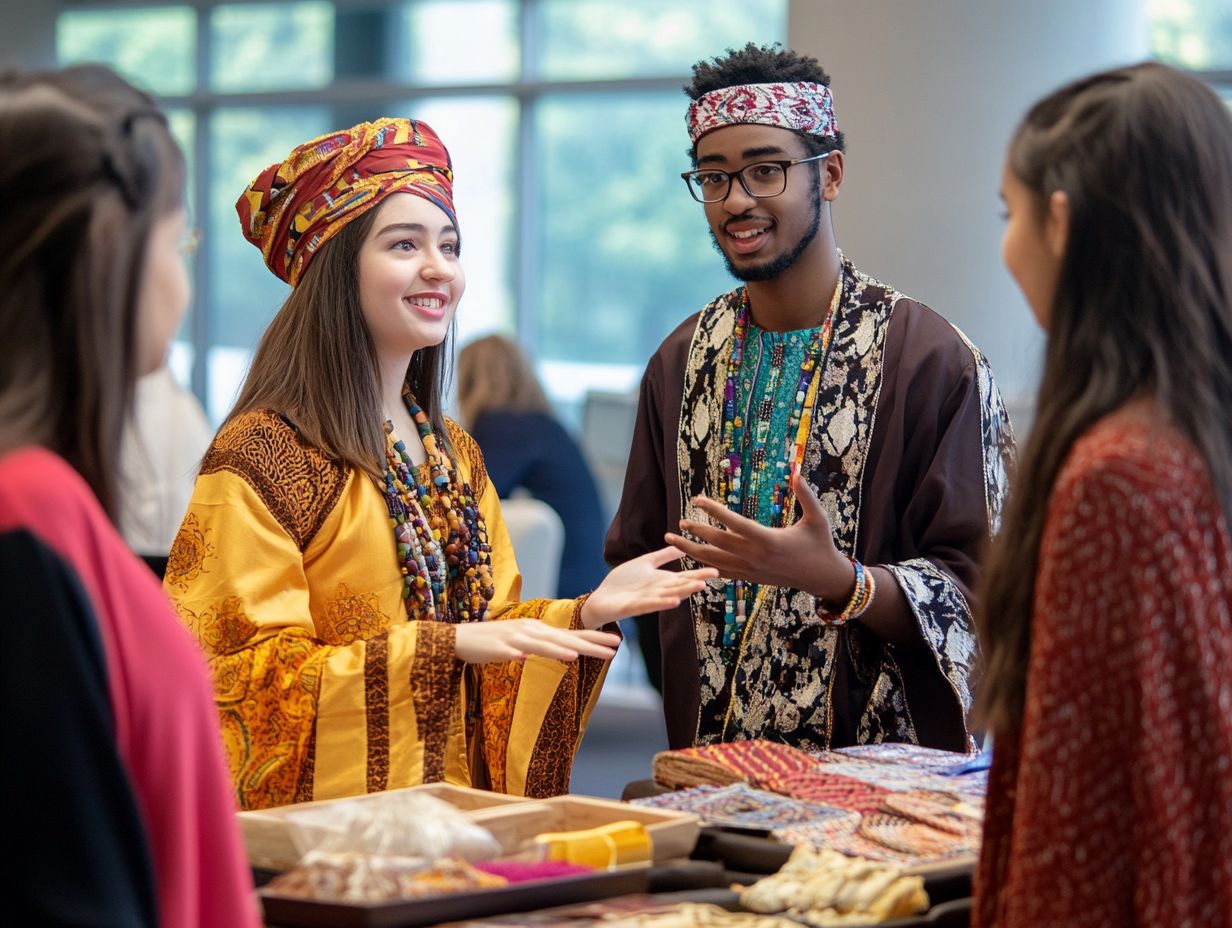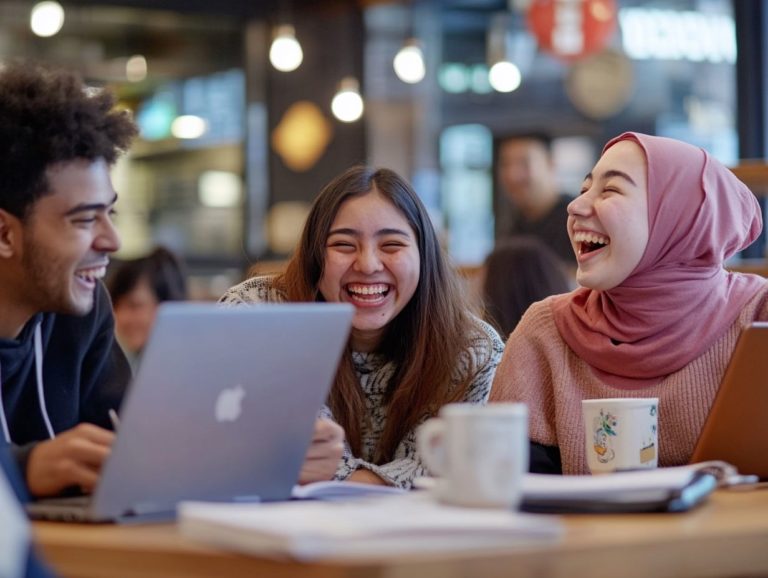Cultural Etiquette Tips for International Students
Navigating a new culture can be exciting but also daunting, especially for international students. Understanding cultural differences helps you communicate effectively and form meaningful relationships.
This exploration highlights why cultural etiquette matters. It offers insights into verbal and nonverbal communication, as well as dining and social norms.
Respecting local customs is vital. With practical tips, you ll feel prepared to embrace your international experience with confidence.
Contents
- Key Takeaways:
- Understanding Cultural Differences
- Communicating Effectively Across Cultures
- Navigating Social Interactions
- Respecting Cultural Norms and Values
- Adapting to a New Culture
- Frequently Asked Questions
- What are some cultural etiquette tips that international students should know?
- How can I familiarize myself with the cultural norms of the country I will be studying in?
- What are some common mistakes that international students make when it comes to cultural etiquette?
- Is it important to learn the local language when studying in a foreign country?
- What should I do if I accidentally offend someone while trying to follow cultural etiquette?
- How can I show respect for the local culture while still maintaining my own cultural identity?
Key Takeaways:

- Understanding cultural differences is key for international students to avoid misunderstandings.
- Effective communication requires awareness of nonverbal cues and adapting your communication style.
- Respecting local customs, such as religious practices and gender roles, builds positive relationships.
Understanding Cultural Differences
As an international student, understanding cultural differences is essential. You’ll encounter unique local customs and norms, so it’s helpful to learn about cultural etiquette tips to navigate these experiences effectively.
In cities like Belfast, social dynamics are vibrant, enriched by community identity and local traditions, like the lively pub culture and celebrations like St. Patrick’s Day.
By embracing these differences, you can build respect and friendships while participating in community activities that enhance your education and personal growth.
Why Cultural Etiquette is Important
Cultural etiquette is crucial for smooth social interactions. It helps create mutual respect in Northern Ireland’s unique environment.
Learning local customs prevents misunderstandings and enriches your experience. For example, offering a cup of tea symbolizes warmth and friendship.
You ll notice local kindness, like queuing patiently, reflecting community values. Engaging with these customs opens doors for deeper connections.
Communicating Effectively Across Cultures
Effective communication is essential for international students. It helps you navigate diverse conversation topics and understand different accents.
Nonverbal Communication
Nonverbal communication is key to expressing meaning, especially in a new culture. You will see various body language and gestures in Northern Ireland.
Understanding these signals is vital. For example, maintaining eye contact shows honesty, while in some cultures, it may indicate respect.
Be aware that a thumbs-up gesture usually means approval, but can be rude in other contexts. Personal space norms also vary; locals may prefer closer interactions.
By understanding these nuances, you enhance your social experiences and build deeper connections in this rich cultural environment.
Verbal Communication

Verbal communication involves not just spoken language but also local slang. This can greatly impact your interactions as an international student, helping you engage in meaningful conversations in the cultural landscape of Belfast, Northern Ireland.
Understanding the subtle details of both English and Irish, including regional dialects and colloquialisms, is essential for building authentic connections. Grasping local expressions enhances your comprehension and shows respect for the community’s cultural heritage.
This knowledge lets you navigate discussions on topics that resonate with locals, such as sports, music, and traditional festivals. It effectively bridges cultural divides.
By mastering verbal communication, you can fully participate in social gatherings, enriching your experiences and making them more enjoyable.
Navigating social interactions can be challenging for international students. Understanding dining etiquette and the protocols for greetings and introductions is crucial for cultivating friendships and engaging with the community in Belfast, Northern Ireland. Additionally, utilizing social media tips for international students can enhance connections and support during your stay.
Etiquette for Dining and Socializing
Dining etiquette plays a key role in making new friends in Northern Ireland. Local customs beautifully embody the rich traditions of Irish hospitality and the lively pub culture that characterizes Belfast.
At a meal, wait for your host to start the festivities. This simple act shows respect for their role. Engage in lively conversation, share anecdotes, and enjoy the laughter that defines genuine Irish hospitality.
Be mindful of your table manners. Keeping your elbows off the table and using your utensils properly are basic rules that reflect your consideration for others.
In pubs, patrons often exchange friendly banter while standing at the bar. When you sit down, remember to ensure your drink is never empty before raising a toast. This is a cherished aspect of socializing in this vibrant culture.
Respecting Cultural Norms and Values
Respecting cultural norms and values is crucial for international students aiming to integrate into the community identity of Northern Ireland. For more guidance, consider exploring tips for adjusting to life in a new culture, which includes navigating religious customs and understanding gender roles that shape social dynamics.
Embracing these elements will enhance your experience and foster meaningful connections within the community.
Religious Customs and Traditions
Religious customs and traditions, like St. Patrick’s Day, play a significant role in shaping Northern Ireland’s cultural landscape. As an international student, understanding these nuances is vital for cultivating cultural sensitivity.
These celebrations often reflect deep-rooted historical narratives and communal values, affecting interpersonal dynamics across societies. For example, understanding the significance of lighting candles during Diwali a celebration of light helps you show mutual respect among diverse backgrounds.
By engaging with these practices, you enhance your experiences and demonstrate appreciation for the rich tapestry of cultural identities. This promotes inclusivity and harmony in your interactions. A thoughtful approach to these traditions can lead to deeper connections and meaningful dialogue across communities.
Gender Roles and Expectations

Gender roles and expectations can differ significantly across cultures. For you, as an international student in Northern Ireland, understanding local customs is essential for navigating social interactions with ease.
In a society where traditional norms often blend with modern influences, the views on masculinity and femininity shape personal identities and influence community networks. You might notice that social expectations guide behavioral cues, communication styles, and even professional interactions.
Within various communities, these roles tend to echo historical legacies while evolving to embrace increasing diversity. By recognizing and adapting to these expectations, you can cultivate more meaningful connections and integrate more seamlessly into your new environment. This will enrich your experience and deepen your understanding of Northern Ireland’s unique cultural landscape.
Adapting to a New Culture
Adapting to a new culture presents a complex process for international students like you. It requires considerable effort to avoid mistakes that might offend others while simultaneously embracing mentorship opportunities and nurturing personal growth in an unfamiliar setting such as Belfast, Northern Ireland.
Tips for Adjusting and Avoiding Cultural Faux Pas
Adjusting to a new culture demands both awareness and effort. This is especially true for international students like you who want to navigate the social landscape of Northern Ireland while understanding local dress codes to avoid stumbling into cultural mistakes.
You ll feel a rush of excitement as you discover local customs! Taking a proactive approach can truly transform your experience. Attending etiquette training sessions can be a game-changer; these programs highlight the nuances of local customs and social norms that you won’t find in guidebooks.
By immersing yourself in local traditions from mastering the art of appropriate greetings to perfecting your dining etiquette you ll pave the way for genuine connections and cultivate a sense of belonging. Engaging with locals, whether through volunteering or joining clubs, will broaden your understanding and foster acceptance, making your cultural transition much smoother.
Frequently Asked Questions
What are some cultural etiquette tips that international students should know?
Some cultural etiquette tips for international students include being aware of personal space, observing social norms and customs, understanding nonverbal communication, and navigating cultural shock by showing respect for the local culture.
How can I familiarize myself with the cultural norms of the country I will be studying in?

You can familiarize yourself with cultural norms by researching and reading about the country, talking to people who have lived or studied there before, and attending cultural events or workshops.
What are some common mistakes that international students make when it comes to cultural etiquette?
Some common mistakes that international students make include using inappropriate language or gestures, not acknowledging cultural differences, and not respecting societal norms and customs. To avoid these pitfalls, it’s important to learn about cultural etiquette for students in Thailand.
Is it important to learn the local language when studying in a foreign country?
Yes, it is important to learn the local language as it shows respect for the culture and helps with communication and integration into the local community.
What should I do if I accidentally offend someone while trying to follow cultural etiquette?
If you accidentally offend someone, apologize sincerely and try to understand why your actions were considered offensive. It is also helpful to educate yourself further on the cultural norms to prevent similar situations in the future.
How can I show respect for the local culture while still maintaining my own cultural identity?
You can show respect for the local culture by being open-minded and willing to learn while also staying true to your own cultural identity. It is also important to communicate and educate others about your culture in a respectful manner.






